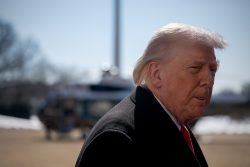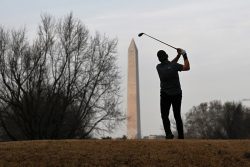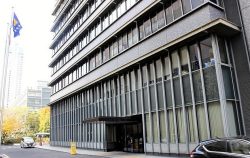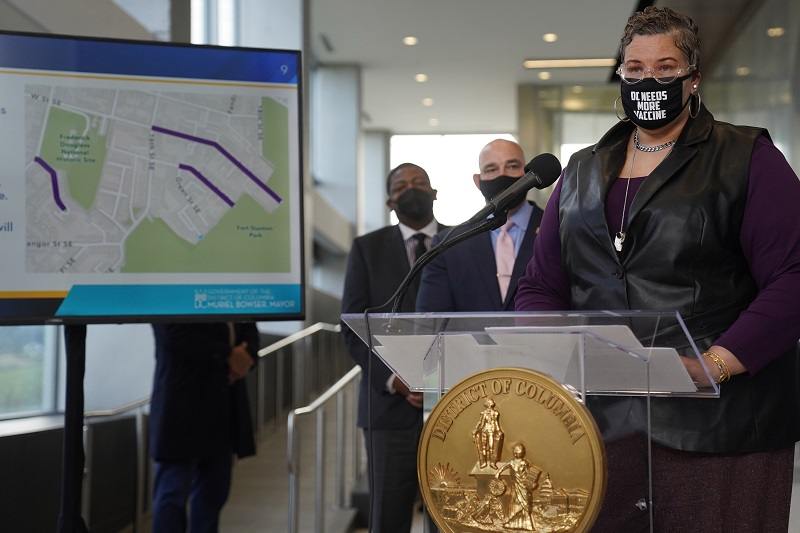
Linda Harllee Harper, D.C.’s first gun violence prevention director, announces the mayor’s Building Blocks DC program to limit gun crime on Feb. 17, 2021. A rise in violence has led to a clamor from some residents to crack down on offenders.
15:19 JST, June 7, 2022
WASHINGTON – A D.C. police officer pulled over the driver of a Pontiac Bonneville because it had license plates registered to a different type of car, then spotted an open container of alcohol and ordered its occupants to step outside.
A search turned up two silver handguns – one, which was legally registered, in the driver’s pants; the other, which was not, in a green and white bag in the trunk.
Police arrested all four young men who had been in the vehicle, charging each with multiple gun offenses.
But prosecutors soon dropped the cases. According to police, they wanted more evidence to link the illegal gun in the trunk to a specific person in the Bonneville. Eight months after they were taken into custody last fall, those in the group remain uncharged.
Officials across the country have been under immense pressure to curb gun crimes – even before a gunman attacked and killed 19 children and two teachers last week in Texas, and another gunman shot and killed 10 people in a Buffalo supermarket less than two weeks before that. Gun crimes have soared across the country in recent years, with the Centers for Disease Control and Prevention recently reporting that the firearm homicide rate in 2020 reached its highest level in a quarter-century. Police and prosecutors have focused on reducing the number of illegal firearms on the streets, as other officials debate tightening who can purchase guns legally.
The experience in the District of Columbia highlights how aggressive tactics to seize guns can exacerbate tensions with communities and collide with the realities of successful prosecutions. To substantiate a case in court, police must show they had legitimate reason to conduct a search and tie a gun to a specific person, which can be a difficult task.
And defense attorneys and criminal justice advocates say officers are often stopping young Black men on flimsy pretexts and bringing weak cases in a so-far-unsuccessful effort to quell shootings.

Guns at the D.C. Department of Forensic Sciences in 2019. To build a court case, police must show they had legitimate reason to conduct a search and tie a gun to a person. Defense attorneys say the police are bringing weak cases.
Police said they seized more than 2,400 illegal firearms in 2021, a slight increase from the previous year. The pace is accelerating this year, with 54% more illegal firearms confiscated than at this time in 2021. At the same time, homicides are rising for the fifth year in a row.
About half the people charged with murder typically have a prior gun arrest, according to police, though not necessarily a conviction. In the week the men in the Bonneville were stopped, D.C. police arrested 23 people for gun offenses; prosecutors did not pursue charges against 13 of them. Of the 10 people charged, six were convicted, with sentences ranging from participation in a diversion program to 18 months behind bars, court records show. Four are awaiting trial.
At a news conference to announce a crime-fighting initiative last fall, D.C. Police Chief Robert Contee told reporters and residents that prosecutors’ declining to bring cases was “very frustrating,” and he worried people released from custody pending further investigation could be “picking up another gun.” He said he wanted investigators to build solid cases but added: “I also want to see people going to jail and being held accountable when they violate our community and go out there and use illegal firearms in our city.”
The aggressive tactics police use to seize guns have long drawn scrutiny. The Police Reform Commission, a panel formed by the D.C. Council after the killing of George Floyd by police in Minneapolis, argued in an April 2021 report that officers on special squads such as the Gun Recovery Unit “use aggressive stop and search tactics” and recommended sweeping changes, such as barring officers from citing “high crime areas” as a partial justification for stopping people. Social and racial justice advocates have called for D.C. police to disband the unit altogether.
In 2019, an effort by the U.S. attorney’s office in D.C. to prosecute felons caught with illegal firearms in federal court, rather than Superior Court, generated controversy after it was learned the initiative targeted three predominantly Black wards. Officials had claimed it would be enforced citywide. Sentences in federal court are generally harsher, which officials hoped would be a deterrent.
Police have signaled openness to change. Two months after Contee became chief in January 2021, a Gun Recovery Unit commander circulated a memo urging others to rethink some of the aggressive tactics.
“No idea is too small or too radical,” the commander wrote, causing a stir in the office for saying the policing style of the past two decades was “no longer what we should be doing.”
Contee said at the time that he wanted police to shift away from seizing as many guns as possible to finding the people “that pull the trigger.”
But with a steady drumbeat of police-blotter items flowing across Twitter – spitting out shards of frightening crime alerts that include shootings, gun offenses and carjackings across the District – making significant changes is easier said than done. The increase in gun violence has led to a clamor from some residents to crack down on offenders, even as members of the D.C. Council work to restrict police tactics as part of efforts ushered in by social justice protests in the summer of 2020.
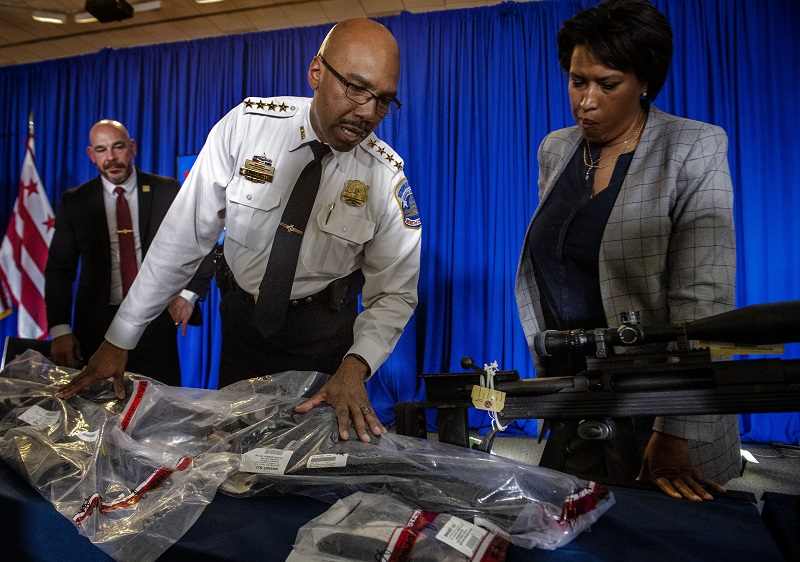
From left, D.C. Deputy Mayor for Public Safety Chris Geldart, Police Chief Robert Contee and Mayor Muriel Bowser, with guns collected from the shooter who terrorized Washington’s Van Ness area in April. Police in the District seized 52 illegal firearms in the first week of May and another 58 illegal guns the following week.
‘A very high standard’
Each week, D.C. police post listings of gun seizures and people arrested, along with photos of confiscated firearms. The weapons range from small pistols to semiautomatic rifles, many built from home kits.
Police in the District seized 52 illegal firearms in the first week of May, near Union Station, the White House, Capital One Arena and elsewhere. Police seized another 58 illegal guns the following week.
To the frustration of police, the path from arrest to prosecution to prison is a difficult one.
During the first half of 2021, the U.S. attorney’s office said prosecutors in D.C. Superior Court pursued 112 of the 186 felon-in-possession cases brought by police. Forty-five of the cases were considered still under investigation, and 29 were dropped altogether.
The U.S. attorney’s office said it was unable to provide more recent data or data for federal court in the District. Officials also said they did not have data on other types of gun crime prosecutions.
Prosecutors argue they are limited by case law in D.C. To survive legal scrutiny, they have to assess why an officer stopped a person in the first place, what cause they had to search a person or their vehicle and what evidence they have tying a particular person to a particular weapon.
The U.S. attorney’s office has experienced losses in the appeals court, which officials said have shaped their strategies.
In 2014, for example, D.C. police stopped the driver of a vehicle with a broken brake light in Southeast Washington and found suspected marijuana in the center console. The vehicle was registered to the driver’s girlfriend, and police got a warrant to search her home, finding a bag containing a Glock 9mm handgun, mail in the driver’s name and drawings by the couple’s child under a bed.
Prosecutors ultimately won a conviction against the man on gun charges. But the D.C. Court of Appeals threw it out, saying the evidence connecting the man to the gun was “quite thin” and ruling authorities had failed to “establish the link between the gun and a criminal enterprise.”
Similarly, in January, the D.C. Court of Appeals overturned the conviction of a man who was arrested by members of the Gun Recovery Unit in 2016 in Northeast Washington. The appeals court decided officers did not have sufficient evidence to detain the man, rejecting prosecutors’ argument that police were in their rights to approach him because he was in a “high crime area” and had made “slight adjustments with his front waistband.”
“We must meet a very high standard of connecting a given person to a given gun,” said Chrisellen Kolb, the chief of the appellate division for the U.S. attorney’s office in the District.
A person does not need to be caught holding a gun by authorities. But if a gun is found in the trunk of a car with five people inside, who can get charged?
“The answer is, probably nobody, until we can get DNA off of the gun,” Kolb said.
Police and prosecutors say they confer daily over gun arrests, reviewing body-camera video to help build cases or learn of unforeseen pitfalls. Prosecutors said they try to talk with the arresting officer before deciding to drop a case.
“If we can prosecute a gun case, we’re going to do it,” said Alyse Constantinide, who departed as chief of the U.S. attorney’s office’s early-case-assessment section shortly after an interview for this story. “But we are bound by the law . . . and that’s why we try to get more evidence and bring cases back later, rather then just sending them away forever.”
Police Cmdr. Ramey J. Kyle, who heads the Narcotics and Special Investigations Division, which includes the gun squad, said the department has adjusted its tactics to try to build stronger cases. Where the department might once have stopped and questioned all 30 people in an area experiencing violence, now officers are “taking a couple of steps back – who’s out there, what’s their background, maybe we set up on them and watch. Instead of stopping all 30, we’re getting in that crowd the person who actually has that gun.”
“The boxes we have to check for each arrest keeps growing and growing and growing,” Kyle said. “But at the end of the day, it makes for better officers and better cases.”
Pushing legal boundaries
Defense lawyers say police sometimes trample constitutional rights to justify stopping someone to prove a hunch that they are armed. Requiring concrete evidence that a person possesses a firearm should not be considered a hurdle, they say, but the starting point for an arrest.
“Imagine, having to prove that a person actually had a gun on him to prove he had a gun,” Anne-Marie Moore, a defense lawyer in the District, said sarcastically.
Moore represents one young man in a group of eight people whom police charged in January with gun offenses. Authorities said they found seven firearms in two vehicles linked to the group, whom they accused of breaking into cars in downtown Washington.
One juvenile in the group had a gun on him, police said. But the other unregistered firearms were found under seats or on the floorboards of the two vehicles.
Prosecutors dropped the firearms counts against the four adults. Only one of them, Moore’s client, was charged by prosecutors in adult court, and only with misdemeanor property destruction and breaking into a vehicle. He was freed pending trial.
Prosecutors said further investigation is needed before filing more serious firearms charges against any of those involved.
Moore declined to specifically discuss her client’s case, but she said police are often too quick to arrest, noting “there is a disconnect between the police and the prosecutors.”
Sweta Patel, a defense attorney, said prosecutors are forced to drop gun cases “because of the lack of training that is taught to the officers who are in charge of making these arrests.”
“I think MPD has worked on the premise of, ‘Let’s get the gun off the street and worry about the constitutional issues later,'” she said.
Patel represents clients suing members of the D.C. police Gun Recovery Unit, alleging a pattern of illegal tactics and indiscriminate stops of young Black men in high-crime neighborhoods.
One of the plaintiffs alleges he was stopped in 2020 while walking down a street carrying a backpack strapped to his chest. Seeing officers in a car behind him, the then-24-year-old slung the backpack he had been holding with one hand to over his shoulders, a move police deemed suspicious.
Police said the bag appeared unusually heavy; the man claimed only a bag of marijuana was inside. The suit alleges that one officer felt the bag and heard a sound when the man shook it. Police searched it and found a loaded .380 handgun. Prosecutors did not pursue criminal charges.
The D.C. Office of the Attorney General, which is defending the officers, called the arrest an example of solid police work, writing in court papers that the man’s behaviors, “when examined in totality,” justified the stop.
In the lawsuit, Patel disputed the officers’ account, asserting that the case is an example of what she described as the District’s “war on guns and young African American men who might carry them.”
The case remains unresolved.
Top Articles in News Services
-

Prudential Life Expected to Face Inspection over Fraud
-

Hong Kong Ex-Publisher Jimmy Lai’s Sentence Raises International Outcry as China Defends It
-

Japan’s Nikkei Stock Average Touches 58,000 as Yen, Jgbs Rally on Election Fallout (UPDATE 1)
-

Trump Names Former Federal Reserve Governor Warsh as the Next Fed Chair, Replacing Powell
-

Suzuki Overtakes Nissan as Japan’s Third‑Largest Automaker in 2025
JN ACCESS RANKING
-

Japan Institute to Use Domestic Commercial Optical Lattice Clock to Set Japan Standard Time
-

Israeli Ambassador to Japan Speaks about Japan’s Role in the Reconstruction of Gaza
-

Man Infected with Measles May Have Come in Contact with Many People in Tokyo, Went to Store, Restaurant Around When Symptoms Emerged
-

Prudential Life Insurance Plans to Fully Compensate for Damages Caused by Fraudulent Actions Without Waiting for Third-Party Committee Review
-

Woman with Measles Visited Hospital in Tokyo Multiple Times Before Being Diagnosed with Disease



